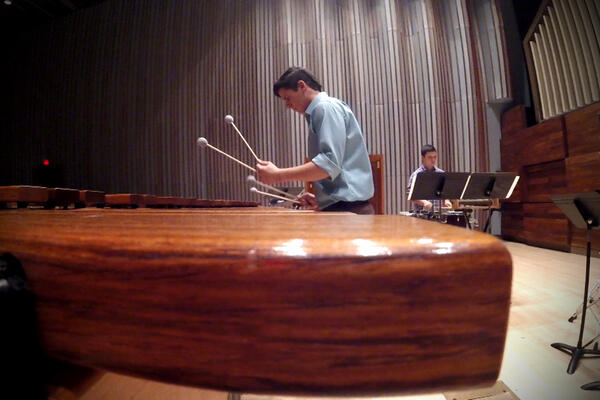On this page:
Why Choose Performance?
You can reach your full potential as a performer while studying at Wright State! Work with experienced, dedicated faculty members in bassoon, clarinet, classical guitar, euphonium or baritone horn, flute, harp, horn, oboe, organ, percussion, piano, saxophone, string bass, trombone, trumpet, tuba, viola, violin, violoncello, or voice. This Bachelor of Music program also includes opportunities for participation in recitals, ensembles, choir, or orchestra.
Careers
Our graduates work as and are employed by:
- Music teacher – Mad River Local Schools
- Worship and music leader – New Life United Methodist Church
- Director of bands and choir – Kansas City Schools
- Singer/dancer – Carnival Cruise Line
- Voice teacher – Piano Preparatory School
The Center for Liberal Arts Student Success (CLASS) helps you complete your degree and achieve success after college. CLASS offers the following workforce development services:
- Personalized and professional career advising
- Liberal arts student career success series
- Experiential education/Internships
- Career-related programs and events
- Liberal arts liaison for all Wright State career resources and services
Success Stories
Academics and Curriculum
Each music performance major is required to participate in at least one university ensemble related to the student's applied music concentration during each semester in which the student is enrolled full time. Assignment to an ensemble is made by the director of bands, director of choral studies, or director of orchestral studies; the appropriate ensemble director; and the student's full-time applied instructor. When the student's applied instructor is not a full-time faculty member, approval must be given by the chair of the student's applied board. To be eligible for the Bachelor of Music degree, the performance major must have a minimum cumulative GPA of 3.0 in the major performing medium and a 2.0 in all other required music courses.
View the Bachelor of Music in Performance program information, degree requirements, and graduation planning strategy in the Academic Catalog.
Concentrations
The school offers majors in the following areas of performance: bassoon, clarinet, classical guitar, euphonium or baritone horn, flute, harp, horn, oboe, organ, percussion, piano, saxophone, string bass, trombone, trumpet, tuba, viola, violin, violoncello, and voice. With school permission, students may major in fields other than those listed. Students must study continuously in their chosen disciplines until they meet all graduation requirements, including the satisfactory public performance of specified recitals during the junior and senior years.
Admission
The path to becoming a music major is different than for other majors. The information below will guide you through the process of becoming a School of Fine and Performing Arts student. This process is necessary for all students who apply to the School of Fine and Performing Arts regardless of your desired degree program.
- To be a student of the School of Fine and Performing Arts, you must also apply and be accepted into Wright State University. Review the admission requirements and complete the admission application.
- Apply to the Music Program. To apply to the program, fill out and submit the undergraduate application.
- Prepare for your audition. Review the audition requirements for your instrument and detailed information about your audition day.
International Students
Explore a great musical and cultural opportunity.
Why study music at Wright State?
- Large enough to offer outstanding musical opportunities, small enough to offer personal attention, Wright State offers a friendly musical environment to learn and grow.
- Outstanding faculty, with artists and scholars committed to teaching students.
- High quality performance ensembles.
- A great location. Dayton offers a vibrant musical environment with other major cities of Columbus, Cincinnati, and Indianapolis a short drive away.
- Financial aid is available for graduate and undergraduate students. Visit the University Center for International Education website to learn more.
- Graduate performance options include: Master of Music in Performance-Instrumental/Vocal/Conducting; Master of Music in Music Education; Master of Humanities in Music.
Where Musicians Succeed
Interpret music of master composers by looking for emotions and expressions behind the notes. Learn how to perform music in a communicative and meaningful way. See how others have found success at Wright State.
"Studying abroad, an experience of a life time."
"Studying at Wright State University has been one of the highlights of my life."
"I am inspired by, and have learned a lot from my professor and fellow-students. Most importantly, I have acquired much knowledge in interpreting music of master composers by looking for emotions and expressions behind the notes, and have learned how to perform music in a communicative and meaningful way."
"I am proud to say that I have made an excellent decision in coming to study at Wright State University."
— Peggy Lau, Piano Performance Major from Macau; 2008 Concerto-Aria Night winner;
Soloist with WSU Symphony Orchestra in Chopin’s Piano Concerto #2 in F minor, March 3, 2009
Admission Requirements
Review Wright State University international admission requirements.
- Completed graduate/undergraduate application form and application fee
- Official transcripts from high school or higher education institution attended with English translation attached
- A financial statement form
- Proof of English proficiency (TOEFL, IELTS, or students who show proof of successful completion of an Intensive English Program from an accredited Institution or program accepted by international admissions are exempt from the requirement to take an approved English Proficiency exam.)
- CD of applicant performing
- Current bank statement in US dollars (for I-20)
- Copy of passport showing name & birth date (for I-20)


